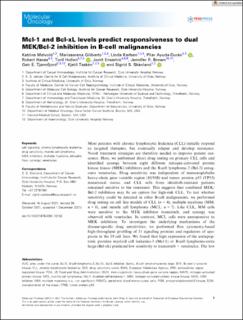| dc.contributor.author | Melvold, Katrine | |
| dc.contributor.author | Giliberto, Mariaserena | |
| dc.contributor.author | Karlsen, Linda | |
| dc.contributor.author | Ayuda-Duran, Maria del Pilar | |
| dc.contributor.author | Hanes, Robert | |
| dc.contributor.author | Holien, Toril | |
| dc.contributor.author | Enserink, Jorrit | |
| dc.contributor.author | Brown, Jennifer R. | |
| dc.contributor.author | Tjønnfjord, Geir Erland | |
| dc.contributor.author | Tasken, Kjetil | |
| dc.contributor.author | Skånland, Sigrid Strand | |
| dc.date.accessioned | 2022-02-04T08:34:52Z | |
| dc.date.available | 2022-02-04T08:34:52Z | |
| dc.date.created | 2022-01-03T15:45:32Z | |
| dc.date.issued | 2021 | |
| dc.identifier.citation | Molecular Oncology. 2021, 1-18. | en_US |
| dc.identifier.issn | 1574-7891 | |
| dc.identifier.uri | https://hdl.handle.net/11250/2977053 | |
| dc.description.abstract | Most patients with chronic lymphocytic leukemia (CLL) initially respond to targeted therapies, but eventually relapse and develop resistance. Novel treatment strategies are therefore needed to improve patient outcomes. Here, we performed direct drug testing on primary CLL cells and identified synergy between eight different mitogen-activated protein kinase kinase (MEK) inhibitors and the B-cell lymphoma 2 (Bcl-2) antagonist venetoclax. Drug sensitivity was independent of immunoglobulin heavy-chain gene variable region (IGVH) and tumor protein p53 (TP53) mutational status, and CLL cells from idelalisib-resistant patients remained sensitive to the treatment. This suggests that combined MEK/Bcl-2 inhibition may be an option for high-risk CLL. To test whether sensitivity could be detected in other B-cell malignancies, we performed drug testing on cell line models of CLL (n = 4), multiple myeloma (MM; n = 8), and mantle cell lymphoma (MCL; n = 7). Like CLL, MM cells were sensitive to the MEK inhibitor trametinib, and synergy was observed with venetoclax. In contrast, MCL cells were unresponsive to MEK inhibition. To investigate the underlying mechanisms of the disease-specific drug sensitivities, we performed flow cytometry-based high-throughput profiling of 31 signaling proteins and regulators of apoptosis in the 19 cell lines. We found that high expression of the antiapoptotic proteins myeloid cell leukemia-1 (Mcl-1) or B-cell lymphoma-extra large (Bcl-xL) predicted low sensitivity to trametinib + venetoclax. The low sensitivity could be overcome by combined treatment with an Mcl-1 or Bcl-xL inhibitor. Our findings suggest that MEK/Bcl-2 inhibition has therapeutic potential in leukemia and myeloma, and demonstrate that protein expression levels can serve as predictive biomarkers for treatment sensitivities. | en_US |
| dc.language.iso | eng | en_US |
| dc.publisher | Wiley Open Access | en_US |
| dc.rights | Navngivelse 4.0 Internasjonal | * |
| dc.rights.uri | http://creativecommons.org/licenses/by/4.0/deed.no | * |
| dc.title | Mcl-1 and Bcl-xL levels predict responsiveness to dual MEK/Bcl-2 inhibition in B-cell malignancies | en_US |
| dc.type | Peer reviewed | en_US |
| dc.type | Journal article | en_US |
| dc.description.version | publishedVersion | en_US |
| dc.source.pagenumber | 1-18 | en_US |
| dc.source.journal | Molecular Oncology | en_US |
| dc.identifier.doi | 10.1002/1878-0261.13153 | |
| dc.identifier.cristin | 1973884 | |
| cristin.ispublished | true | |
| cristin.fulltext | original | |
| cristin.qualitycode | 1 | |

